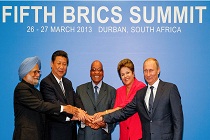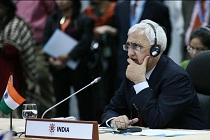A clarion call to study BRICS
The launch of the BRICS Universities League in Shanghai is an important effort for the five nations to understand each other and define their place in global governance
 Courtesy: Blog do Planalto
Courtesy: Blog do Planalto
The launch of the BRICS Universities League in Shanghai is an important effort for the five nations to understand each other and define their place in global governance
 Courtesy: Jacques Delarue/Wikimedia Commons
Courtesy: Jacques Delarue/Wikimedia Commons
The leaderless protests are upending traditional definitions of leadership and forms of hierarchy. Instead, the protestors are seeking some form of direct democracy and dignity.
 Courtesy:
Courtesy:
This daily column includes Gateway House’s Badi Soch – big thought – of the day’s foreign policy events. Today’s focus is on why the government should take a closer look at the kinds of data discovered by PRISM.
 Courtesy: European External Action Service/ Flickr
Courtesy: European External Action Service/ Flickr
The downfall of Egyptian president Mohammad Morsi was partly contributed by those thousands of protesters who disagreed with his view of “Us” and “Them”. Leaders such as Morsi have focused on persecuting those who refuse to share their vision; continuing down this path would have had a negative impact on history
 Courtesy: Semilla Luz/ Flickr
Courtesy: Semilla Luz/ Flickr
The protests in Brazil, Turkey, Egypt and India are bound by a common thread of grievances against misuse of government power and corruption. These modern protests show a marked decline in government trust, even though may not always have clear objectives
 Courtesy: Foreign Affairs
Courtesy: Foreign Affairs
Legal justification and transparency of drone strikes have become a concern for the U.S. In reality, are these targeted killings advancing the strategic goals of U.S. counter-terrorism policy?
 Courtesy: MEAphotogallery/ Flickr
Courtesy: MEAphotogallery/ Flickr
In 2012, Iraq emerged as India’s second largest crude oil supplier thereby shifting focus back on bilateral relations. However, India’s historical and cultural connection with Iraq, as well as common geopolitical concerns, reveal that relations have the potential to go beyond oil
 Courtesy: Legaleagle86/Wikimedia Commons
Courtesy: Legaleagle86/Wikimedia Commons
Policy Perspectives from Gateway House give an overview of a global issue that has implications for India’s policy-making and business community. This edition focuses on the global IPR framework and the need for new business models that can cater to public health concerns
 Courtesy: NASA's Marshall Space Flight Center/Flickr
Courtesy: NASA's Marshall Space Flight Center/Flickr
An increase in the global demand for rare earth elements, used in high-technology industries, coupled with limited supplies on Earth, has accelerated extra-terrestrial exploration. International cooperation and competition for these space-based resources will determine the next human footprint and race in space.
 Courtesy: Penn State Outreach/Flickr
Courtesy: Penn State Outreach/Flickr
The significant shale gas deposits held by several countries, including India, have implications for global energy prices, geopolitics and climate change. But India needs to develop a strong shale gas policy that can help in lowering its trade deficit while ensuring sustainable development.